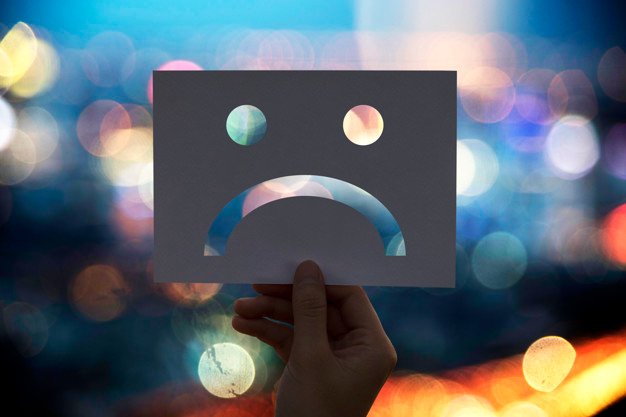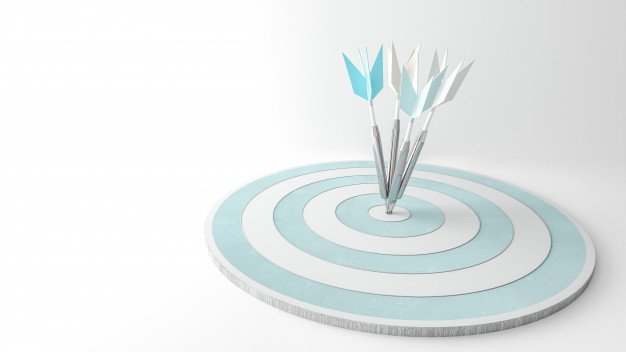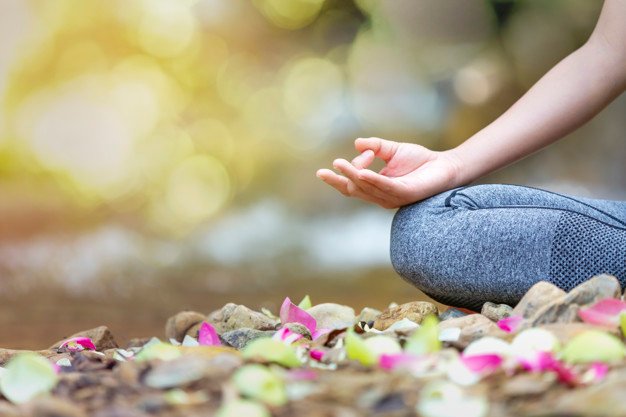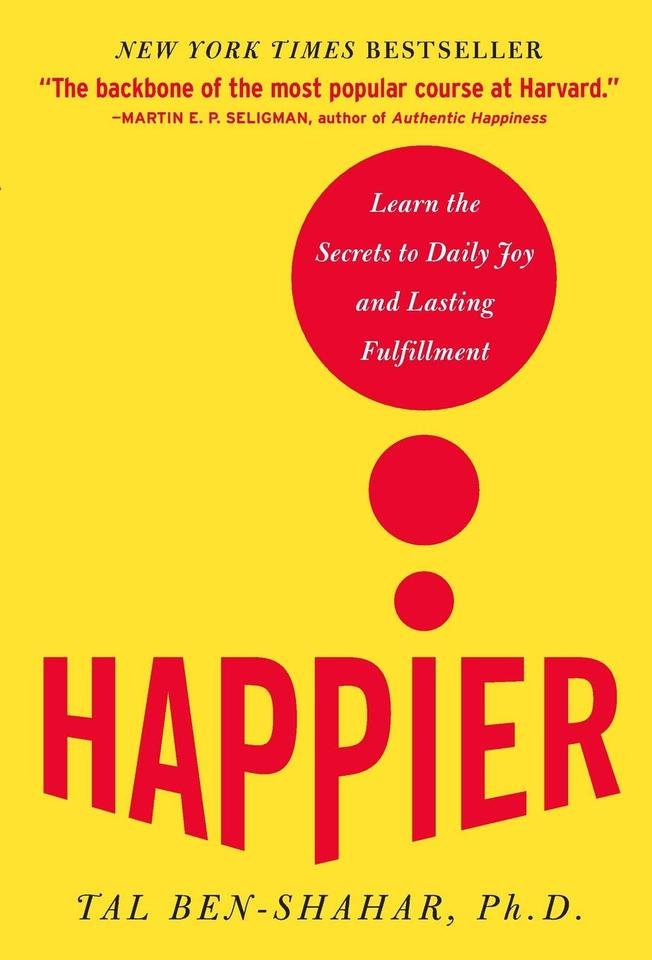photo from www.freepik.com
"Happier: Learn the Secrets to Daily Joy and Lasting Fulfillment"
The best-selling author, Tal Ben-Shahar, is a professor of Psychology at Harvard University. His lecture on "How to be Happier" was Harvard's most popular course with over 1,400 students registered in one semester.
Last week, I stumbled upon one of his lectures on YouTube.
In this video, he talks about Positive Psychology: The Science of Happiness and shares six lessons on how to become happier. As I was listening, I jotted down some notes, and then thought “hmmmm… someone might find this interesting, thought provoking and helpful!” so I decided to share it on my blog. It's mightly long I've warned you but I hope you enjoy it as much as I did! 😊
Martin E.P. Seligman (currently a professor at UPenn) reviewed articles in Psychological Abstracts (1967-2000) and found the following number of articles on: Anger: 5,584; Anxiety: 41,416; Depression: 54,040; Joy: 415; Happiness: 1,710; Life Satisfaction: 2,582
He found that the ratio in favor of negative emotions was 21:1 and thus started a body of research on Positive Psychology in 1998 because he felt there was a need to shift the focus from negative to positive.
What is the Importance of Positive Psychology?
Optimism strengthens our immune system- it makes us more resilient when dealing with the negative (we get sick less often and if we do get sick, we recover more promptly); learning optimism prevents anxiety and depression; focusing on the positive, focusing on what works as opposed to what doesn’t work can act as a buffer against mental illness.
The Big Question: How can we help ourselves and others become happier?
It’s not am I happy or unhappy, it’s how can I become happier.
Six Lessons on How to Become Happier

photo from www.freepik.com
1. Permission to be Human
- Our Misconception: Happiness is not a constant high. We have ups and downs. Lack of acceptance to negative emotions (i.e., fear, upset, anger). Thinking that there’s something wrong with us. This is not the case. Feeling negative emotions = normal. Two kinds of people who don’t experience these emotions: Psychopaths and dead people. So if you experience these emotions, it’s a good sign.
- We need to give ourselves permission to be human. If not, the negative emotions strengthen and become more apparent. As babies/kids we experience emotions and accept it, we develop cognitive and emotional flexibility. However, we lose this flexibility later on when we suppress certain emotions because there’s a negative stereotype to negative emotions. We need unconditional acceptance. Be honest. Be open. When you feel like crying, cry. When you feel like laughing, laugh.
- Emotion vs Behavior: I feel nervous when I stand in front of an audience. I have a choice. Will I show I’m nervous? This is where active acceptance comes in. Accept the emotion, then choose how to behave/ how to act.

photo from www.freepik.com
2. Simplify: Do Less
- In our rat race culture, we try to do more and more things in less and less time and we pay a high price for it.
- We need to take time out. 45% of Americans struggle with deep depression. This is 10x higher today than 1960 and the mean age then was 29, now it’s under 15. Depression is on the rise. One of the main reason is stress. We have too much to do. As a result we feel overwhelmed. We’re stressed.
- We have to simplify. We need to do less. Quantity does affect quality. Too much of a good thing is not good. Chocolate is great but you don’t want to have too much of it. We need to say no to certain things, to certain people. Simplifying has positive results in relationships and life in general. Level of productivity and creativity increases when you do nothing. Seriously.

photo from www.freepik.com
3. Set Self Concordant Goals
- Self concordant goals are goals that are aligned with personal interest and value, goals that we ‘want to’ achieve as opposed to ‘have to’. How many things in your day today that you do because you want to? In order to sustain long term happiness, we have to shift our lives more and more toward the want to’s- find both meaning and pleasure.
- People who have self concordant goals in the long run are more successful, happier and physically healthier.
- Don’t have the luxury to do sth both meaningful and pleasurable? Don’t have the luxury of choosing? Does this mean we are unhappy? NO!!!
- We can do happiness boosters, which are activities that are both meaningful and pleasurable such as doing hobby, volunteering, meeting with friends, etc. These happiness boosters have a trickle effect- it’s not all or nothing. 30 mins, 2 hrs, 4 hrs can make a difference in your life.

photo from www.freepik.com
4. Work on Relationships
- #1 generator of happiness is RELATIONSHIP- duh! When asked for one thing that would make us happier, most say healthier relationship with spouse, soulmates, friends, family, coworkers, etc.
- Divorce rate is 40%. This doesn’t mean the other 60% are happy- sense of duty or habit keeps them in their relationship. Why not great? Part of us is not always conducive to long term relationship. We have an urge for novelty.
- Serial monogamist or polygamist? Is that in our nature? Not necessary because for some people sex does improve over time. Love does grow over time. It happens. It’s documented. The fact that it does happen means that the question is no longer “Is it possible to sustain long term, successful, growing, happy relationship?” but rather “How is this possible?”
- The main thing about successful long term relationships: there are ups and downs. For every 5 positive experiences there is 1 negative experience (argument, disagreement). Not everything is smooth. Disagreement provides a learning opportunity to learn about the other person and ourselves. Conflict immunizes if we overcome. We can overcome a negative experience if we have 5 times as many positive experiences.
- The key to accentuate positive experiences: show interest (know and study each other), make compliments, put aside time for love, for a date (ultimately it’s the little things that makes relationships work in the long run; makes passion grow and relationships last), being known rather than being validated (being fully oneself in a relationship; open up, share and reveal ourselves; it’s not just about looking great all the time, it’s also about exposing our fear and insecurities- saying what we want, being assertive, expressing being ourselves rather than constantly trying to impress)

photo from www.freepik.com
5. Body and Mind Connection
- Sleep, simplifying (having less rather than more to do), importance of touch (we have lost touch)
- Exercise: We were made to work out on the fields, to chase animals, to collect berries for dessert. Our body has a need to physical exercise. If we don’t exercise, we pay psychological, emotional physical price. Exercise helps reduce anxiety, panic disorder, and stress. It generates release of neurotransmitters- norepinephrine, serotonin, and dopamine that are very similar to our most important psychiatric medicine. It’s like taking medicine without side effects.
- Mindful meditation (45mins/day/8 weeks) can change mood and decrease anxiety. According to research, the left side of the pre-frontal cortex becomes more active relative to the right side. The left side is associated with positive moods and high level of resilience and is more acceptable to positive emotions. Likewise, mindful meditation changes the way our brain functions.

photo from www.freepik.com
6. Show Gratitude
- Happiness is largely contingent on our state of mind rather than our status or state of our bank account. Once we have the basics, additional money or prestige doesn’t make a difference on the long run.
- Things that make a difference: Experience of intimate relationships and also learning to focus on the positive. Do we see failure, which is inevitable, as a catastrophe or as a stepping stone? It’s learn to fail or fail to learn. It’s an opportunity to grow. We wouldn’t know how to walk if we didn’t fall.
- It’s about learning to focus on the positive. We adapt to negative things, such as loss, which is good. But we also adapt to positive things which is not so good because we begin to take good things in our life for granted. So often we need things to go wrong so we can appreciate the wonderful things that happen in our lives.
- A Stanford professor researched people who have terminal diseases, who have less than 6 months to live. They reported independently this is the first time in life they feel like they’re alive. They reported they began to focus on the things they can appreciate. Whether it’s the sunshine, family, friends, etc. They were focusing on the details/little things, which are really the big things.
- How do we overcome this inclination to adapt to positive things? How do we not take our lives for granted? Gratitude. When we say thank you to something, we no longer take it for granted.
- Research on Gratitude- people were divided into four groups: 1. gratitude (every night before bed write at least 4 things you’re grateful for- big or little things- meal, family, God, etc), 2. hassles (write 5 hassles in your life, things that didn’t going well), 3. superior (5 things which you are better than others at), 4. control (anything that happened during the day). Participants can repeat themselves. The key is do it mindfully and re-experience the emotion of what you wrote. Researchers followed the groups for six months and up to a year. Findings: They measured the participants on five dependent factors- 1. Physical heath (how often did they visit the doc), 2. How optimistic, 3. How happy, 4. How generous and benevolent toward others and 5. How likely were they to achieve their goals. Results: Hassles < Superior=Control < Gratitude
- Gratitude Journal: 3 minutes makes all the difference- psychological and physical, expressing gratitude and not taking good things for granted. It creates a new schema in our mind that we don’t ignore good things in the day.
- Every day, we are exposed to media bias toward the negative, focusing on things that don’t work. This creates a schema in our mind and we begin to believe that most things happening in our life/world are bad, are negative, are dangerous. Media bias toward the negative is reflected in our internal bias. We absorb that schema from the outside and whether we like it or not we are impacted by it. This exercise (gratitude journal) is an antidote to the negativity that’s out there and can shift our perspective of the world from negative to positive.

How will I apply this to my personal life?
- Exercise 30 mins/day
- Keep a gratitude journal
- Set meaningful 'want to' goals
- LOVE & ACCEPT myself for who I am

photo from www.freepik.com



Good
아항~~^^
화들짝~~^^
ㅎㅎ 우리 이정도는 다 알잖아??^^
ㅋ 해석해줘^^ 미미꽃 ㅋ
3줄로 요약^^
우리 똑순이 😊
좋은 포스팅이네!!호호홋
그치~~~ 역시 디엘 👍🏼👍🏼👍🏼
1&2 하자 ㅎㅎ
아... 언제부터 하지? ㅋㅋㅋㅋㅋㅋㅋㅋㅋㅋ
!popcorn
관람료 내시오.
언니 우리한테 왜 이래요 ㅠㅠ
와우! 선생님 잘 새겨듣겠습니다ㅎㅎ 갑자기 지적인 포스가ㅎㅎ
내가 좀 지적이긴 하지~잉~ ㅋㅋㅋㅋ
okay!!
👍🏼👍🏼👍🏼
허걱 영어... 구글 번역기로 돌려 봐야겠어요 ㅎㅎ
Posted using Partiko iOS
언제 시간나면 한글로 번역해서 올릴게용 ㅋㅋ
👍마지막 꼬마 사진만 봐도 행복해지네요. ㅎㅎ
안피곤님 오랜만이에요! ㅋㅋ
꼬마들 사진은 언제봐도 힐링힐링이죵~ 🌿🌿🌿
곰돌이가 @aileecho님의 소중한 댓글에 $0.016을 보팅해서 $0.007을 살려드리고 가요. 곰돌이가 지금까지 총 3941번 $46.483을 보팅해서 $48.843을 구했습니다. @gomdory 곰도뤼~
으아! 읽는데 무지 오래걸렸구먼유! 해피네쓰는 중요하지요!
행복이 참 마약같은 넘이라 내성이 생겨, 계속 더 자극적인 걸 찾는다고 주장하고 다녔었는데, 범위를 늘려서 행복을 찾는거도 하나의 방법이 될 수 있겠네요.
매일 운동하는건 힘들지 않을까요 :)
대부분의 것엔 내성이 생기지. 그래서 인간은 novelty에 흔들릴 수 밖에- 범위를 늘려서 찾는것이라니~ 천재다 니 ㅋㅋㅋ
그래 넌 널 너무 사랑해. 그게 문제야. 🙈
매일 운동.. 아직 시작도 안함 ㅋㅋㅋㅋㅋㅋㅋㅋㅋㅋㅋㅋ
아임해피~
계속계속 해피해피해랑~~
에일리님... 중세시대 몽마르뜨 가문이 주로 사용하는 문법과 고대 컬트어식 늬앙스가 많이 포함된 영어를 구사하시네요. 영알못을 위한 방송출연 및 해설 부탁드립니다. 섭외 고고~